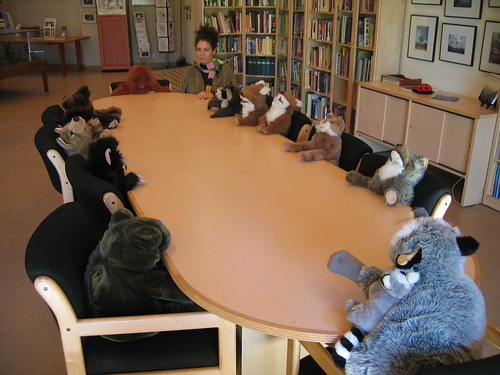
I seem to be on a roll with the business novel form of literature this year. I burned through two TOC-related books, and I have another coming on innovation. This time I picked up Death by Meeting by Patrick Lencioni that I won at the Project Flow conference in September. I had no idea it was going to be another business novel. Lencioni calls it a leadership fable. I wasn't surprised that it was enjoyable, given my experience with hearing him live. It helps that I have seen many meetings like this.
The title is eye-grabbing title, of course. The writing is easy to breeze through. The chapters are short and have obvious titles, like "The Invasion" and "Friendly Fire." Lencioni provides plenty of intentional foreshadowing throughout, so it isn't exactly a novel. The book is geared much more to being about how bad meetings lead to bad decisions, and the story makes those points very clear.
Just how bad are those meetings? The story is a fun description of how terrible bad meetings can be: unfocused, no time for in depth strategic conversations, no help on daily struggles, etc. Even worse, the tone set at the meetings leaks out into the business managed by the people in those meetings. Decisions not made satisfactorily? Then how do you expect your staff to operate? Dread attending the meetings? So does everyone else. Disappointed that you can't dive into your favorite topic, or that it gets glossed over? Yep. Completely numb to the fact that your meetings are killing everyone? How many times have you been in a meeting where you just nodded your head and agreed just to get on with it and go do something more meaningful? I know I have.
That's the situation - possibly overdone - in this fable. It's only until a naive, young protagonist comes on the scene and just blurts out the truth: these meetings are terrible! Then what do you do about it? Our protagonist can't help himself and goes into his own training (as a film student) to try to figure out what is wrong and how to repair it. The solution devised in the comes in a couple of revelations to the protagonist. The first is that bad meetings bury conflict, so conflict needs to come to the surface - in a constructive way. It's only then that the group can come to a useful conclusion about the topic, rather than ignoring the issues only to have it come up again, and again, and again.
The other element has to do with context - one of my favorite KM-related topics. As in there are appropriate contexts for different types of topics. And that conflict in the first realization: it belongs in certain contexts and not in others. The protagonist devises four contexts and compares them to different entertainment options:
- The daily, 5-minute meeting. It's like Headline News, where you get the highlights of the day and provide any help that your colleagues might need. It eliminates the constant back-and-forth status emails or phone calls or visits that waste the day.
- The weekly tactical meeting. This is like a sitcom or crime drama, where the the basic topic for the hour comes out in the first five to ten minutes with updates and metrics reviews. The attendees decide what deserves their time for the rest of the hour and move it forward. If strategic topics arise during the discussion they are tabled for strategic meetings.
- Strategic meetings (monthly and ad-hoc) are like full length movies. People come prepared - having done the research required for the topic (having read the movie hype). The meetings have a hook at the outset (the key topics to be discussed) and they have drama or conflict - again, this is conflict in the Lencioni sense of making sure all the participants articulate their positions. And there is conclusion: the strategic topics get answered.
- And finally there are quarterly off-sites, which are compared to mini series. This is where the executives cover the ground on key long-term business goals and direction that they cannot cover in any of the other meetings. Again, if a topic relevant to another context arises, it is tabled for the appropriate context.
Reading the setup of these types of meetings, I heard a lot of similarities to the talk that Lencioni gave at the conference where I won the book.
[Photo: "Tiare - Board Meeting - Franklin Canyon" by tiarescott]